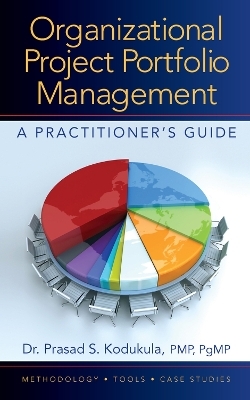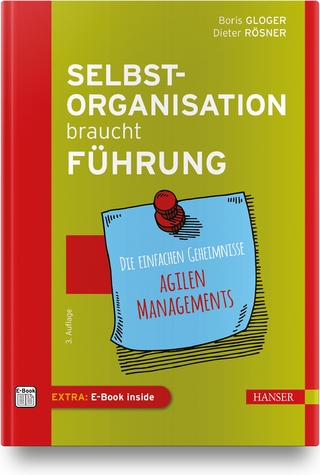
Organizational Project Portfolio Management
J Ross Publishing (Verlag)
978-1-932159-42-4 (ISBN)
Organizational Project Portfolio Management: A Practitioner's Guide offers a generic, practical methodology and tool kit to design, build, and manage a balanced portfolio at any level of the enterprise. These techniques can be used irrespective of business industry, where the portfolio management group is located within the organizational hierarchy, or the type of projects contained.
Key Features:
Discusses how the principles of financial portfolio management are applicable to project portfolios, and outlines the three key steps to achieving a profitable project portfolio: 1) Defining your project investment strategy, 2) Selecting the right projects, and 3) Effectively managing them
Presents a model and PPM methodology for a balanced portfolio based on concepts similar to a framework known as the 'balanced scorecard' that allows you to create a balance along any project characteristic such as size, risk, and development time
Demonstrates how earned value management techniques can be effectively applied at the portfolio level and addresses risk and uncertainty
Explains how to reprioritize projects when resources become limited, utilize key metrics to monitor and manage portfolio performance, and determine whether a project should be continued or terminated
Uses a case study to illustrates how you can apply the methods and tools presented throughout the text and includes case study exercises to enhance the learning process
WAV offers downloadable charts for managing resources, discounted cash flow and Monte Carlo simulation spreadsheets, and worksheets for portfolio and project case examples in the book - available from the Web Added Value Download Resource Center
Dr Prasad Kodukula, PMP, PgMP, is an award-winning educator, accomplished engineer, author, and inventor with 25 years of professional experience. Dr. Kodukula is co-founder and president of Constant Compliance, Inc., a Chicago-based technology company that specializes in developing and commercializing environmental and homeland defense technologies. His clients include 15 of the Fortune 100 companies and the U.S. government. He has managed many research/development and engineering projects and project teams while working as a senior project manager at a multi-national engineering consulting firm and a global chemical company. Prasad holds degrees from the Illinois Institute of Technology, Cornell University, and Rutgers University. He was recognized by the Project Management Institute as Best of the Best in project management with a 2010 PMI Distinguished Contribution Award. His first book with J. Ross Publishing, Project Valuation Using Real Options: A Practitioner's Guide, is a best seller and he has also written more than 40 technical articles.
SECTION 1: PROJECT PORTFOLIO BASICSChapter1: IntroductionWhat is a Project Portfolio?What is Project Portfolio Management?Why Portfolio Management?How Your Organization Can Benefit From Portfolio Management?Who Needs Portfolio Management?What is the Status of Portfolio Management Today?Chapter 2: Project PortfolioWhat is a Project Portfolio?What Makes a Portfolio Effective?Types of PortfoliosChapter 3: Projects, Programs & PortfoliosProjectsProgramsPortfolios and Their Relationship to Projects and ProgramsChapter 4: Portfolio Model: Funnel & Filters(R)Funnel & Filters(R)Funnel & Filters(R) vs. Phase GatesValue Creation ProcessChapter 5: Project vs. Financial PortfoliosPortfolio ComponentsStrategyPortfolio ObjectivePortfolio ValuePortfolio RiskApplying Financial Portfolio Principles to Project PortfoliosSECTION 2: PPM METHODOLOGYChapter 6: PPM MethodologyCreating and Managing a Financial PortfolioProject Portfolio Management MethodologyChapter 7: Build FoundationDelineate Strategic FrameworkEstablish GovernanceBuild Portfolio InfrastructureChapter 8: Design PortfolioIdentify Design RequirementsEstablish Portfolio BenchmarksChapter 9: Construct PortfolioBuild New PortfolioCalibrate Portfolio Chapter 10: Monitor & Control PortfolioIdentify ProjectsCategorize ProjectsEvaluate New ProjectsEvaluate Ongoing ProjectsPrioritize New and Ongoing ProjectsRebalance PortfolioSelect or Terminate Projects SECTION 3: PPM TOOLS & TECHNIQUESChapter 11: Project EvaluationProject Evaluation: FinancialsProject Evaluation: Non-FinancialsChapter 12: Project PrioritizationProject Ranking ToolsData Visualization ToolsChapter 13: Uncertainty & RiskUncertaintyRiskProject Risk ManagementPortfolio Risk ManagementTools & Techniques for Uncertainty & RiskChapter 14: Earned Value ManagementBackgroundEVM Foundation: Project BaselinesLevel of Planning DetailEVM Building BlocksCurrent Project Performance IndicatorsFuture Project Performance IndicatorsPortfolio PerformanceEVM's PotentialChapter 15: Resource PlanningWhy PPM for Resource Planning?Role of PPM in Resource PlanningRolling Wave PlanningBottleneck AnalysisResource LevelingEstimates of Effort vs. Lapse Time in Resource PlanningFactors Affecting Resource AvailabilityResource Planning ToolsChapter 16: PMOCurrent State of PracticePMO ScopePMO FunctionsPMO Maturity PMO Organizational StructurePMO's Role in PPMSECTION 4: PPM CASE STUDYChapter 17: Case StudyExercises1) Portfolio Foundation2) Portfolio Design3) Portfolio Construction4) Portfolio Balancing5) Project Ranking by Efficient Frontier Method6) Project Ranking by Paired Comparison and Forced Ranking7) Project Go/No-GoExhibits1) GeneMatrix Profile2) GeneMatrix Future Plan3) New and Ongoing Projects Listing 4) New and Ongoing Projects Data5) Benefits and Costs of Projects That Generate Financial Value6) New Project Request: Nanopore Technology & Next Generation Sequencer
| Verlagsort | Florida |
|---|---|
| Sprache | englisch |
| Maße | 152 x 229 mm |
| Gewicht | 572 g |
| Themenwelt | Wirtschaft ► Betriebswirtschaft / Management ► Projektmanagement |
| Wirtschaft ► Betriebswirtschaft / Management ► Unternehmensführung / Management | |
| ISBN-10 | 1-932159-42-8 / 1932159428 |
| ISBN-13 | 978-1-932159-42-4 / 9781932159424 |
| Zustand | Neuware |
| Haben Sie eine Frage zum Produkt? |
aus dem Bereich


